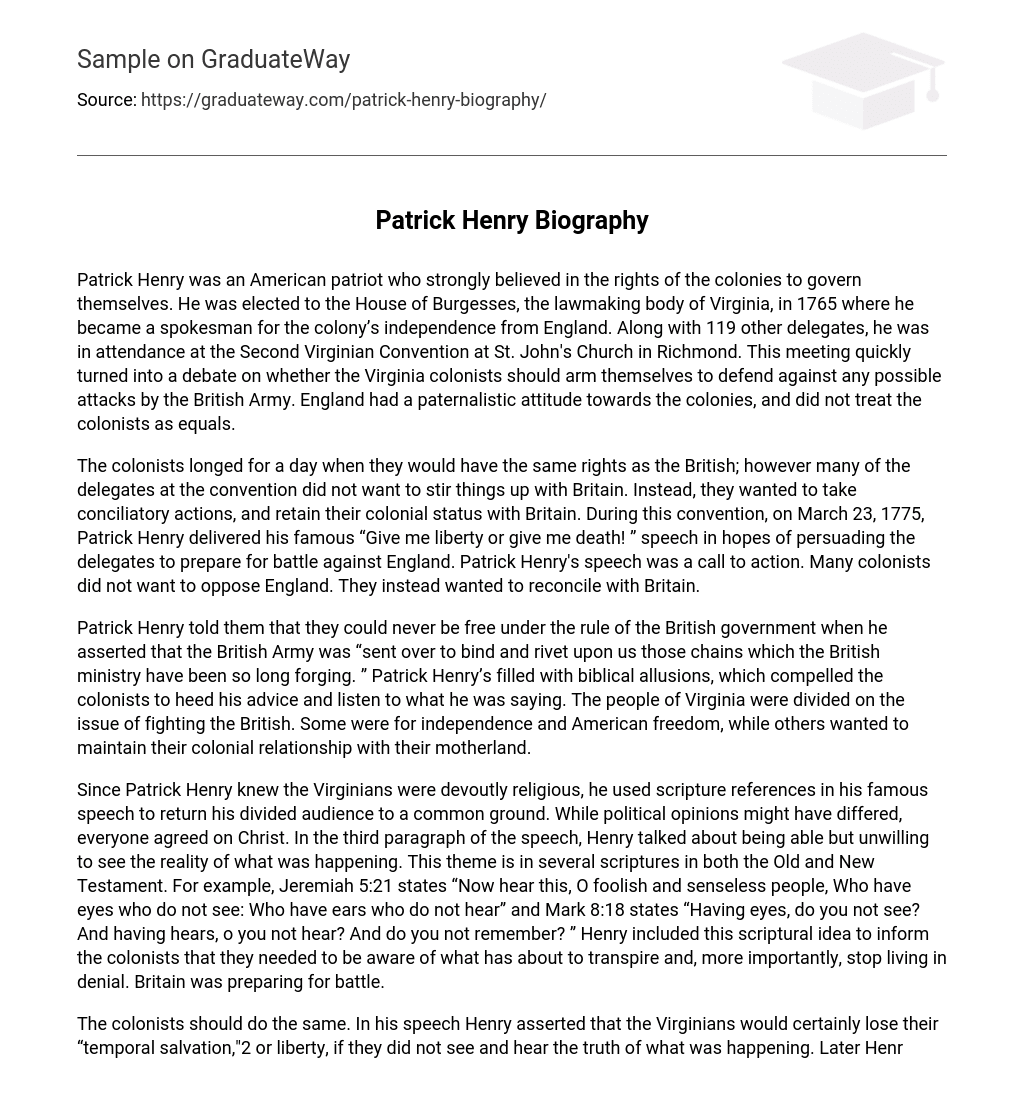Patrick Henry was an American patriot who strongly believed in the rights of the colonies to govern themselves. He was elected to the House of Burgesses, the lawmaking body of Virginia, in 1765 where he became a spokesman for the colony’s independence from England. Along with 119 other delegates, he was in attendance at the Second Virginian Convention at St. John’s Church in Richmond. This meeting quickly turned into a debate on whether the Virginia colonists should arm themselves to defend against any possible attacks by the British Army. England had a paternalistic attitude towards the colonies, and did not treat the colonists as equals.
The colonists longed for a day when they would have the same rights as the British; however many of the delegates at the convention did not want to stir things up with Britain. Instead, they wanted to take conciliatory actions, and retain their colonial status with Britain. During this convention, on March 23, 1775, Patrick Henry delivered his famous “Give me liberty or give me death! ” speech in hopes of persuading the delegates to prepare for battle against England. Patrick Henry’s speech was a call to action. Many colonists did not want to oppose England. They instead wanted to reconcile with Britain.
Patrick Henry told them that they could never be free under the rule of the British government when he asserted that the British Army was “sent over to bind and rivet upon us those chains which the British ministry have been so long forging. ” Patrick Henry’s filled with biblical allusions, which compelled the colonists to heed his advice and listen to what he was saying. The people of Virginia were divided on the issue of fighting the British. Some were for independence and American freedom, while others wanted to maintain their colonial relationship with their motherland.
Since Patrick Henry knew the Virginians were devoutly religious, he used scripture references in his famous speech to return his divided audience to a common ground. While political opinions might have differed, everyone agreed on Christ. In the third paragraph of the speech, Henry talked about being able but unwilling to see the reality of what was happening. This theme is in several scriptures in both the Old and New Testament. For example, Jeremiah 5:21 states “Now hear this, O foolish and senseless people, Who have eyes who do not see: Who have ears who do not hear” and Mark 8:18 states “Having eyes, do you not see? And having hears, o you not hear? And do you not remember? ” Henry included this scriptural idea to inform the colonists that they needed to be aware of what has about to transpire and, more importantly, stop living in denial. Britain was preparing for battle.
The colonists should do the same. In his speech Henry asserted that the Virginians would certainly lose their “temporal salvation,”2 or liberty, if they did not see and hear the truth of what was happening. Later Henry equated this loss of salvation with death. He starts the next paragraph by saying, “I have but one lamp by which my feet are guided, and that is the lamp of experience. This statement reminds the listeners of Psalm 119:105, “Your word is a lamp unto my feet, and a light unto my path. ” Henry uses this vivid language to demonstrate how passionately he feels about Virginia’s war preparation against the British. He equates his viewpoint to the God’s word. Thus Virginian independence is both God-inspired and God-directed; freedom is God’s path. Later in the speech, Henry switched from telling the audience about what he believes will happen, and begins to warn them not to be deceived by the British.
Henry states, “Suffer not yourselves to be betrayed with a kiss. ”5 As anyone who is familiar with the Easter story knows, this refers to Judas Iscariot betraying Jesus with a kiss on the cheek. Judas conspired with the guards to identify Jesus so they could arrest him. To those around the situation, a kiss would have appeared to be a friendly gesture, but it was a betrayal nonetheless. In the speech, Henry warned the colonists of British friendliness. They were enemies and their actions should be taken as malicious. Henry later called the colonists to action against the British.
He does this when he referenced 2 Chronicles 32:8 which states, “With him is only an arm of flesh, but with us is the Lord our God to help us and fight our battles. ” He reminded the colonists that their fight was holy and justified. Triumph and victory were sure because God was on their side. In the final paragraph of the speech, Henry referenced Jeremiah 6:14 which states, “They have healed the brokenness of My people superficially, Saying, ‘Peace, peace,’ But there is no peace. ” When the people began to fear God’s udgments, the false prophets comforted them by saying that God would send peace, not war. God’s people took his threats lightly, just as the colonists were taking the British threat lightly. Henry’s speech ultimately ended the debate and a decision was made to arm the colonies in preparation for the impending war with the British. The speech united the colonists and stirred them to take action against the British. As a result of his speech, Virginia was the first colony to call for separation from England and the Revolutionary War started less than a month after Henry’s speech.





